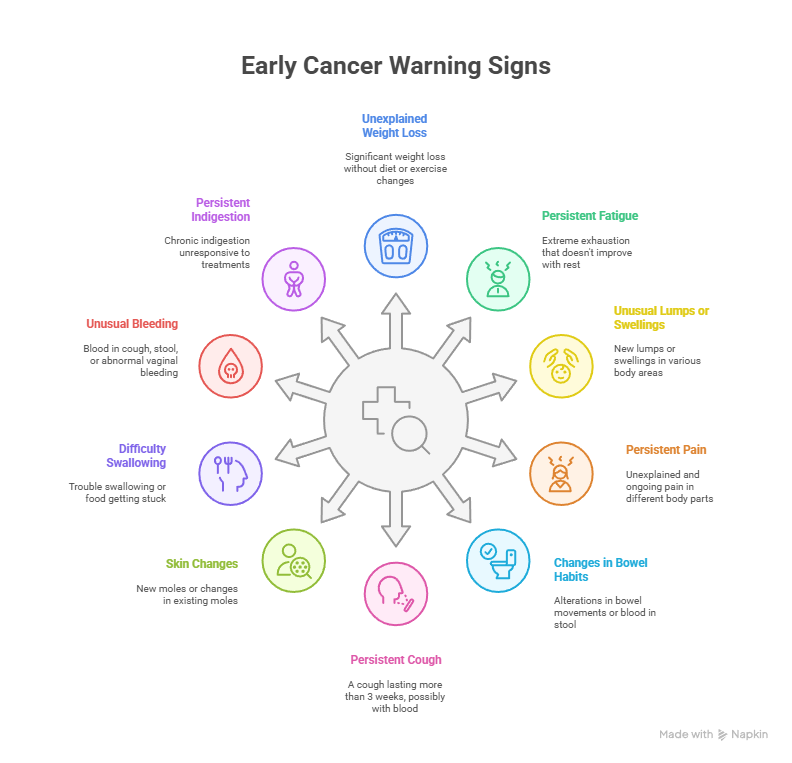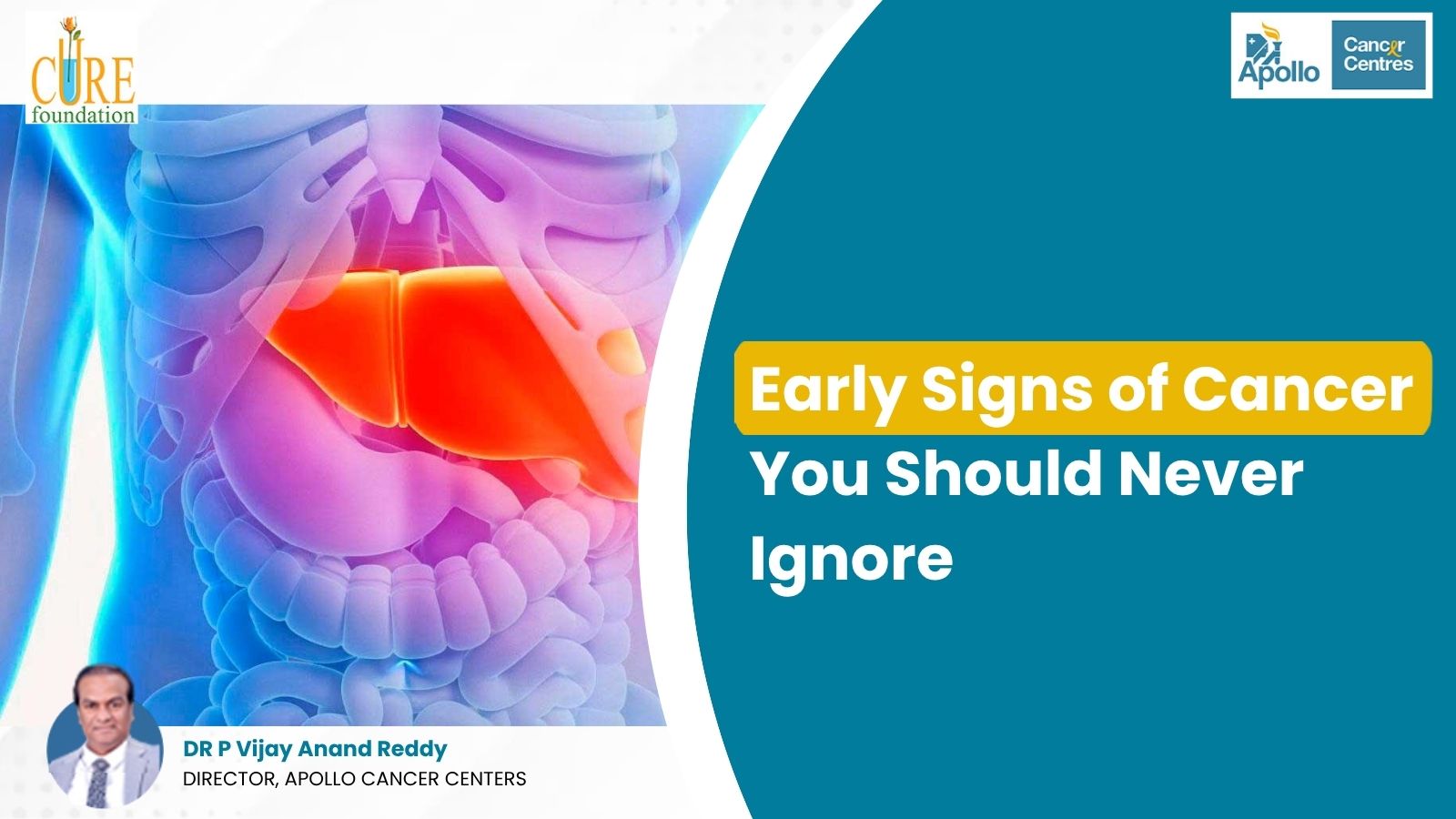Cancer is a disease that often develops silently, with symptoms appearing only when it has reached an advanced stage. However, recognising early warning signs can make a life-saving difference. Many cancers, when detected early, are highly treatable, with significantly better outcomes.
In this blog, we will discuss the most common early signs of cancer that should never be ignored. Being aware of these symptoms and seeking timely medical advice can lead to early diagnosis, more effective treatment, and higher survival rates.
Why Early Detection Matters
Cancer is the second leading cause of death globally, but early-stage detection can improve survival rates by up to 90% for certain cancers, such as breast and colorectal cancer. Unfortunately, many people dismiss early symptoms or mistake them for minor health issues, delaying diagnosis until the disease has progressed.
Key benefits of early detection:
- More treatment options (less aggressive therapies may be effective).
- Higher cure rates (early-stage cancers are often localised and easier to treat).
- Lower treatment costs (advanced cancer care is far more expensive).
10 Early Warning Signs of Cancer You Should Never Ignore

1. Unexplained Weight Loss: Losing 10 pounds or more without diet or exercise changes can be a red flag for cancers such as pancreatic, stomach, lung, or oesophageal cancer.
2. Persistent Fatigue: While fatigue is common, extreme exhaustion that doesn’t improve with rest could indicate leukaemia, colon cancer, or other malignancies affecting blood cells or metabolism.
3. Unusual Lumps or Swellings: Any new lump, thickening, or swelling in the breast, testicles, lymph nodes, or soft tissues should be checked immediately.
4. Persistent Pain: Pain that doesn’t go away and has no obvious cause may signal bone cancer (osteosarcoma), brain tumours, or metastatic cancer.
5. Changes in Bowel or Bladder Habits
- Long-term constipation, diarrhoea, or blood in stool → Possible colon or rectal cancer.
- Frequent urination, blood in urine, or pain while urinating → Could indicate bladder or prostate cancer.
6. Persistent Cough or Hoarseness: A cough that lasts more than 3 weeks, especially with blood, may be a sign of lung or throat cancer.
7. Skin Changes:
- New moles or changes in existing moles (asymmetry, irregular borders, colour changes) → Possible melanoma.
- Yellowing of skin (jaundice) → Could indicate liver or pancreatic cancer.
8. Difficulty Swallowing: Persistent trouble swallowing or a feeling of food getting stuck may suggest oesophageal or throat cancer.
9. Unusual Bleeding
- Blood in the cough (lung cancer)
- Blood in stool (colon cancer)
- Abnormal vaginal bleeding (cervical or uterine cancer)
- Easy bruising or excessive bleeding (leukaemia)
10. Persistent Indigestion or Heartburn: Chronic indigestion that doesn’t respond to usual treatments could be a sign of stomach, oesophageal, or pancreatic cancer.
When Should You See a Doctor?
If any of these symptoms last longer than 2-3 weeks or worsen over time, consult a doctor immediately. While these signs don’t always mean cancer, early evaluation is crucial to rule out serious conditions.
High-Risk Individuals Should Be Extra Vigilant:
- Family history of cancer
- Smokers or heavy alcohol users
- People with chronic infections (HPV, Hepatitis B/C)
- Those exposed to radiation or harmful chemicals
The Role of Regular Screenings
Even without symptoms, routine cancer screenings (like mammograms, colonoscopies, and Pap smears) can detect cancer early. Consult your doctor to determine the optimal screening schedule tailored to your age and risk factors.
Expert Insight: Dr. Vijay Anand Reddy
Dr. Vijay Anand Reddy, a world-renowned oncologist and Director of Apollo Cancer Institute, emphasises:
“Early detection is the most powerful weapon against cancer. Many lives can be saved if people recognise warning signs early and seek medical advice without delay. Prevention and timely intervention are key to winning the battle against cancer.”
With over three decades of experience in oncology, Dr. Reddy has been instrumental in advancing radiation therapy and personalised cancer treatment in India. His expertise underscores the importance of awareness, early diagnosis, and cutting-edge treatment in improving cancer survival rates.
Final Thoughts
Cancer doesn’t always announce itself loudly—sometimes, the signs are subtle. Listen to your body, act on persistent symptoms, and prioritise regular check-ups. Early detection saves lives, and ignoring warning signs can be a dangerous gamble.
Stay alert. Get screened. Fight cancer before it fights you. Book an appointment on +919676720002.

